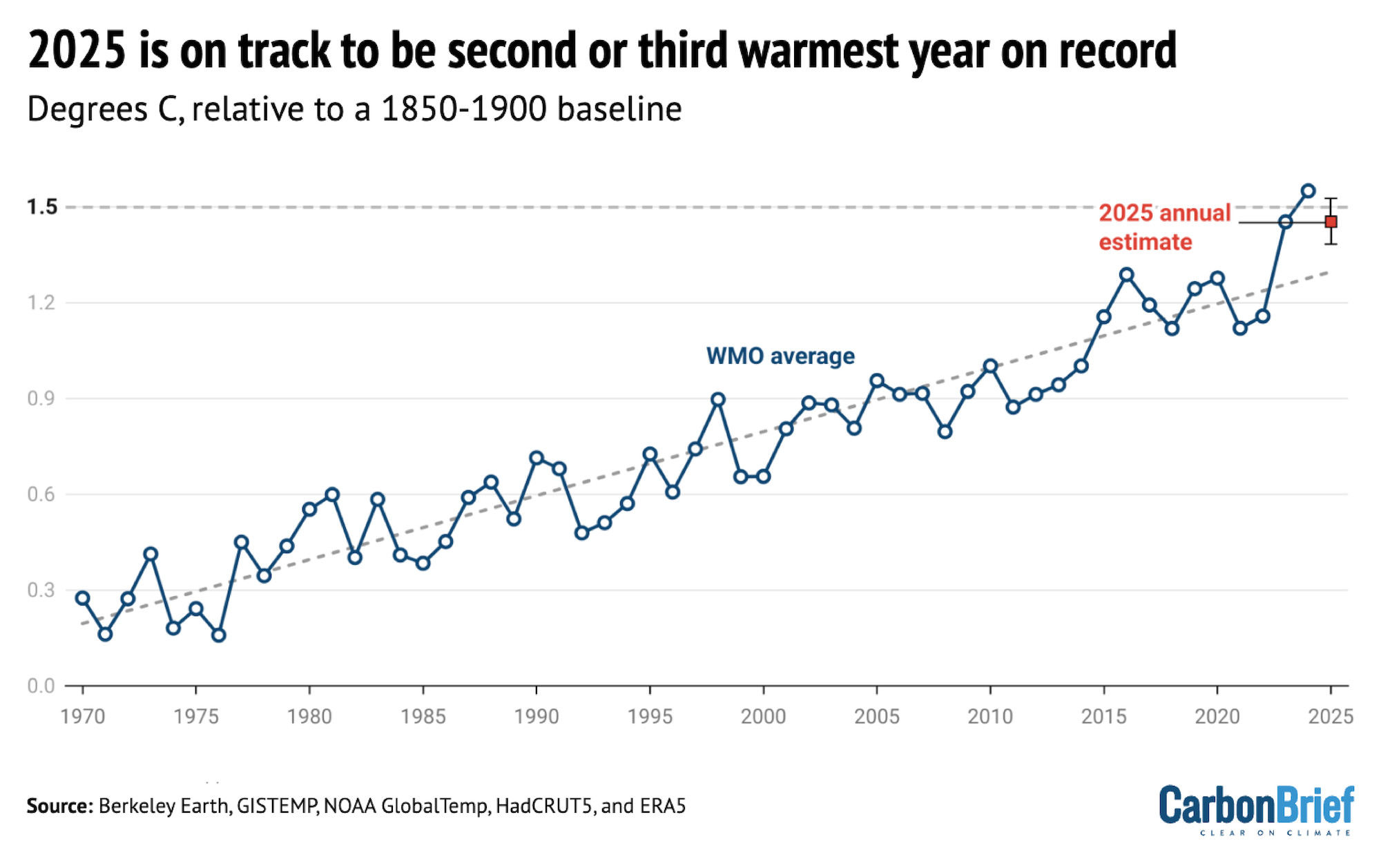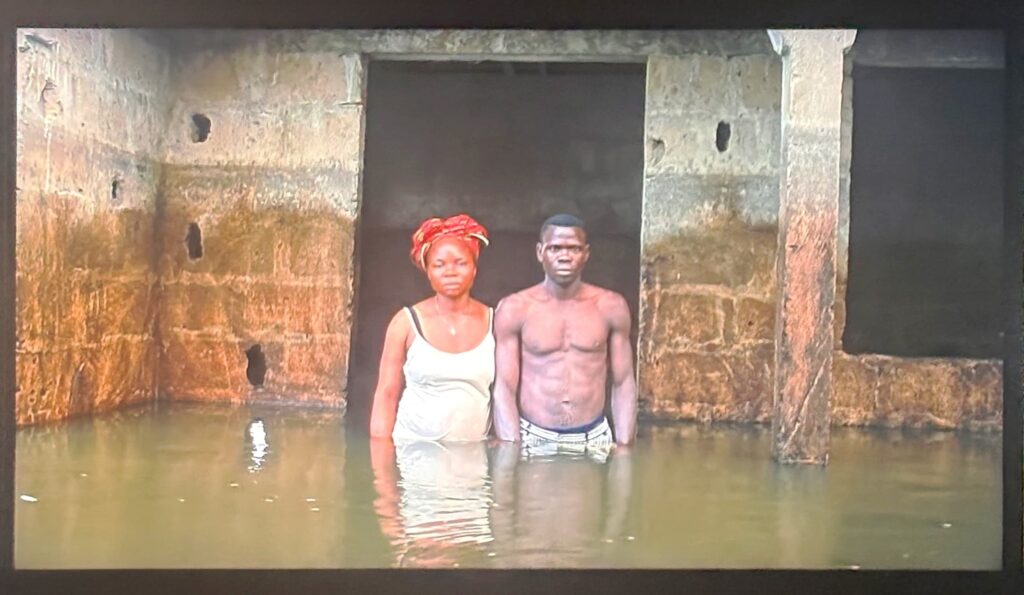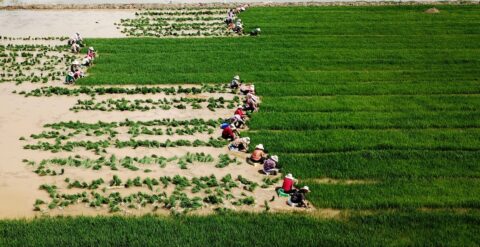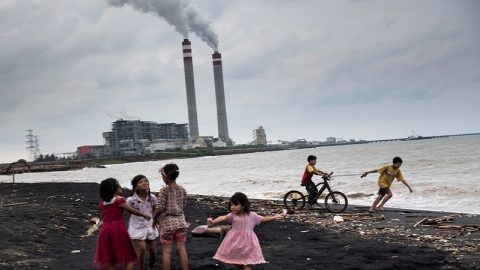Welcome to Carbon Brief’s DeBriefed.
An essential guide to the week’s key developments relating to climate change.
This week
Trump to overturn ‘endangerment finding’
EPA OVERTURNING: The Trump administration announced its plan to overturn the 2009 finding that has been the “central basis” for US action to regulate greenhouse gas emissions, the Associated Press reported. A new Environmental Protection Agency proposal would rescind the “endangerment finding”, which determined that carbon dioxide and other greenhouse gases endanger public health and welfare, according to the newswire. If the finding is repealed, it would “erase current limits” on greenhouse gas pollution from cars, factories and power plants, AP said.
‘MISLEADING’ REPORT: The proposal is supported by a new Department of Energy report that uses “misleading and inaccurate” statements to argue that climate science has “overstated” the risks of a warming planet, Politico reported. The report, which also argues that climate science is “underestimating” the societal benefits of burning fossil fuels, was written by five scientists who “are known” for “denying accepted climate science”, the outlet added.
‘WINDMILL DISGRACE’: Wind development on federal lands and waters may be halted by the Trump administration, Bloomberg reported. Interior secretary Doug Burgum ordered a comprehensive review of the agency’s approval process, it said. According to Renewable Energy News, the department said more than 3.5m acres offshore were designated as “wind energy areas” by the last administration and that “terminating” these areas is “safeguarding” local environments and economies from “unchecked development”. This followed from Trump’s recent comment that “windmills are a disgrace”, the publication added.
Floods and heatwaves
SEVERE FLOODING: Torrential rains triggered a devastating flood in northern Nigeria, leaving at least 23 people dead, Deutsche Welle reported. The flooding has displaced 5,560 people and left dozens injured, according to the National Emergency Management Agency. More than 200 people have been killed in floods in Nigeria since the start of the rainy season in May this year, according to DW. The outlet reported that scientists have said climate change is fuelling many of these extreme weather occurrences.
BEIJING RAINS: China faced “another deadly rainy season” after 60 people were killed following days of torrential rain in Northern Beijing, reported Reuters. The outlet said climate change has made extreme weather “more frequent and intense”. Elsewhere, floodwaters from the Indus and Chenab rivers have “inundated” more than a dozen villages across Pakistan’s Punjab province, said India’s Tribune.
RECORD TEMPERATURE: Japan recorded its hottest day on record as temperatures reached 41.2C in southwest Tokyo, Al Jazeera reported. There were 16 heat-related deaths and more than 10,800 people were hospitalised with heatstroke last week, the outlet said. Meanwhile, the Iraqi government issued an official holiday in seven of its provinces as temperatures topped 50C, said Gulf News.
‘MILLIONS’ INSIDE: Temperatures soaring in the US have led to “millions” of Americans being warned to stay inside as some areas reach 48.8C, noted Newsweek. Heat warnings and advisories have been issued by the National Weather Service, according to the outlet.
Around the world
- ENERGY PLEDGE: The European Union has pledged to buy $750bn of energy from the US in exchange for a lower tariff rate under its trade deal with Trump. “Significant purchases” of US oil, liquified natural gas and nuclear fuel to replace Russian fossil fuels are included in the deal, CNBC reported. The Financial Times quoted energy experts saying the deal is a “pie in the sky” given that “US fossil fuel supplies [in 2024] to the bloc accounted for just $75bn”.
- COP30 COSTS: The UN held an “urgent meeting” over “sky-high” accommodation costs ahead of the COP30 climate summit in Brazil, Reuters reported. Meanwhile, the last US climate negotiators have been fired by the Trump administration, leaving the nation with “no official presence” at the summit, said CNN.
- ‘MELTING RAPIDLY’: Glaciers in Turkey’s southeast are melting rapidly due to rising global temperatures “amid human-caused climate change”, Al Jazeera reported.
- ‘SEWAGE CRISIS’: The US and Mexico have signed a deal to end the Tijuana “sewage crisis”, committing to update outdated wastewater infrastructure to handle higher flows triggered by worse flooding, said Inside Climate News.
- RENEWABLE ENERGY: Australia’s government has pledged to “substantially increase” its renewable energy underwriting scheme following concerns the nation will struggle to meet its 2030 power target, noted the Guardian. Meanwhile, New Zealand’s government has voted to resume gas and oil drilling despite an “outcry” from the opposition and environmental groups, reported the New Zealand Herald.
- ‘UNHELPFUL TUSSEL’: UN climate chief Simon Stiell paid a visit to Australia and urged the nation and Turkey to resolve their “long-running tussle” over who will host the COP31 summit, calling the delay “unhelpful and unnecessary”, Reuters reported.
66.8 million
The hectares of intact tropical forest that overlaps with oil blocks in the Democratic Republic of Congo, according to Earth Insight.
Latest climate research
- Climate change could make ‘droughts’ for wind power 15% longer | Carbon Brief
- A study of urban construction workers in Taiwan found that heat stress imposes “substantial economic burden” and results in productivity losses in the range of 29-41% | Nature Cities
- Drought will increasingly contribute to the collapse of many bird species that live in highly arid regions of the US | Biological Conservation
(For more, see Carbon Brief’s in-depth daily summaries of the top climate news stories on Monday, Tuesday, Wednesday, Thursday and Friday.)
Captured

New analysis by Carbon Brief this week revealed that 2025 is on track to be the second or third hottest year on record. The chart above draws on data from five different research groups that report global surface temperature records to illustrate how 2025 saw the second-hottest first half of the year on record.
Spotlight
‘Thirst’ exhibition maps the water crisis
This week, Carbon Brief visits a London exhibition exploring the world’s worsening water crisis.
Intricate ink drawings on cotton paper explore interconnected issues in Nepal.
Global warming has melted glaciers in the region, causing flooding and infectious diseases, displacing human and non-human life.
Yet, through his drawings, Nepalese artist Karan Shrestha has created a mosaic of the Himalayan region that shows water as a signifier of extreme weather and a life-giving source to be shared.

His piece, “Water-giver, memory-keeper and the shifting forces”, is displayed at the Wellcome Collection for its “Thirst: In Search of Freshwater” exhibition.
Brought together by Wellcome curator and lecturer Janice Li, it features 125 objects that showcase the impact of climate change on water and its role in shaping health and ecosystems.
Li’s research into the etymology of “thirst” unravelled a global interpretation of water, reflecting the exhibition’s geographical breadth. She told Carbon Brief:
“Humans have faced really brutal and critical environmental crises and have, through a really deep innate knowledge of their own specific land, been able to devise monumental infrastructure to combat the crises they face.”
Just before Shrestha’s art in the exhibition are photographs taken by M’hammed Kilito.
In one picture, Kilito’s guide, Mustapha, looks into a dried-up well in a Moroccan oasis.
Climate change and human activities have resulted in the loss of two-thirds of oases in the country, according to information displayed at the exhibition.
Speaking about the photograph, Kilito told the Guardian that it looked like Mustapha was “praying for the return of something essential: water”.
Water adopts multiple faces in the exhibition: a vital yet scarce resource in certain pieces, a spiritual entity in others – and a destructive force.
Nothing makes the latter as clear as “Deluge” by photojournalist Gideon Mendel. Five screens display footage of the aftermath of severe floods around the world, captured by Mendel over 17 years.

Li told Carbon Brief:
“[Gideon] told me that, in the last two years, there’s always been a flood of that magnitude happening somewhere. He didn’t imagine that one day it would get to a point where he would have to choose which one to go to.”
Next to “Deluge” is a dome-like space where visitors can sit on bean bags and listen to glaciers melting in the Himalayas.
Though the exhibition confronts global water challenges, Li hopes it also reminds visitors of the resource’s beauty:
“Quite a few people told me they sit in the listening room for half an hour, really enjoying themselves and then guilt hits them because they’ve forgotten they’re listening to melting ice. But, this is the beauty of art, and a lot of beauty has come out of decay, destruction and deterioration because it also, sometimes, signals rebirth.”
Watch, read, listen
YAK HERDERS STRUGGLE: The Associated Press featured the stories of yak herders in India’s Himalayan mountains as climate change threatens their way of life.
PILOT ANXIETY: A Guardian documentary followed two airline pilots grappling with the climate impacts of their jobs.
‘IS DECARBONISATION DEAD?’: New York Times columnist Ezra Klein invited climate experts onto his podcast to discuss the future of renewable energy in the US.
Coming up
- 5-14 August: Second part of the fifth session of the Intergovernmental Negotiating Committee to Develop an International Legally Binding Instrument on Plastic Pollution, Geneva, Switzerland
- 9 August: UN international day of the world’s Indigenous peoples
- 11-15 August:UN Environment Programme’s International Methane Earth Observatory at AmeriGeo Week 2015: Earth Observations for the Americas, Bogotá, Colombia
Pick of the jobs
- Climate Justice Standard Lab, research associate in forest carbon and climate justice | Salary: $25-35 an hour. Location: Remote
- The Church of England, net-zero carbon programme decarbonising churches lead | £59,248. Location: Remote
- UN Office for Project Services, country engagement specialist and regional coordinator for eastern europe, Santiago network | Salary: Unknown. Location: Geneva, Switzerland
DeBriefed is edited by Daisy Dunne. Please send any tips or feedback to debriefed@carbonbrief.org.
This is an online version of Carbon Brief’s weekly DeBriefed email newsletter. Subscribe for free here.
The post DeBriefed 1 August 2025: Trump targets ‘endangerment finding’; Floods and heatwaves; ‘Thirst’ exhibition appeared first on Carbon Brief.
Climate Change
Using energy-hungry AI to detect climate tipping points is a paradox
David Sathuluri is a Research Associate and Dr. Marco Tedesco is a Lamont Research Professor at the Lamont-Doherty Earth Observatory of Columbia University.
As climate scientists warn that we are approaching irreversible tipping points in the Earth’s climate system, paradoxically the very technologies being deployed to detect these tipping points – often based on AI – are exacerbating the problem, via acceleration of the associated energy consumption.
The UK’s much-celebrated £81-million ($109-million) Forecasting Tipping Points programme involving 27 teams, led by the Advanced Research + Invention Agency (ARIA), represents a contemporary faith in technological salvation – yet it embodies a profound contradiction. The ARIA programme explicitly aims to “harness the laws of physics and artificial intelligence to pick up subtle early warning signs of tipping” through advanced modelling.
We are deploying massive computational infrastructure to warn us of climate collapse while these same systems consume the energy and water resources needed to prevent or mitigate it. We are simultaneously investing in computationally intensive AI systems to monitor whether we will cross irreversible climate tipping points, even as these same AI systems could fuel that transition.
The computational cost of monitoring
Training a single large language model like GPT-3 consumed approximately 1,287 megawatt-hours of electricity, resulting in 552 metric tons of carbon dioxide – equivalent to driving 123 gasoline-powered cars for a year, according to a recent study.
GPT-4 required roughly 50 times more electricity. As the computational power needed for AI continues to double approximately every 100 days, the energy footprint of these systems is not static but is exponentially accelerating.
UN adopts first-ever resolution on AI and environment, but omits lifecycle
And the environmental consequences of AI models extend far beyond electricity usage. Besides massive amounts of electricity (much of which is still fossil-fuel-based), such systems require advanced cooling that consumes enormous quantities of water, and sophisticated infrastructure that must be manufactured, transported, and deployed globally.
The water-energy nexus in climate-vulnerable regions
A single data center can consume up to 5 million gallons of drinking water per day – sufficient to supply thousands of households or farms. In the Phoenix area of the US alone, more than 58 data centers consume an estimated 170 million gallons of drinking water daily for cooling.
The geographical distribution of this infrastructure matters profoundly as data centers requiring high rates of mechanical cooling are disproportionately located in water-stressed and socioeconomically vulnerable regions, particularly in Asia-Pacific and Africa.
At the same time, we are deploying AI-intensive early warning systems to monitor climate tipping points in regions like Greenland, the Arctic, and the Atlantic circulation system – regions already experiencing catastrophic climate impacts. They represent thresholds that, once crossed, could trigger irreversible changes within decades, scientists have warned.
Yet computational models and AI-driven early warning systems operate according to different temporal logics. They promise to provide warnings that enable future action, but they consume energy – and therefore contribute to emissions – in the present.
This is not merely a technical problem to be solved with renewable energy deployment; it reflects a fundamental misalignment between the urgency of climate tipping points and the gradualist assumptions embedded in technological solutions.
The carbon budget concept reveals that there is a cumulative effect on how emissions impact on temperature rise, with significant lags between atmospheric concentration and temperature impact. Every megawatt-hour consumed by AI systems training on climate models today directly reduces the available carbon budget for tomorrow – including the carbon budget available for the energy transition itself.
The governance void
The deeper issue is that governance frameworks for AI development have completely decoupled from carbon budgets and tipping point timescales. UK AI regulation focuses on how much computing power AI systems use, but it does not require developers to ask: is this AI’s carbon footprint small enough to fit within our carbon budget for preventing climate tipping points?
There is no mechanism requiring that AI infrastructure deployment decisions account for the specific carbon budgets associated with preventing different categories of tipping points.
Meanwhile, the energy transition itself – renewable capacity expansion, grid modernization, electrification of transport – requires computation and data management. If we allow unconstrained AI expansion, we risk the perverse outcome in which computing infrastructure consumes the surplus renewable energy that could otherwise accelerate decarbonization, rather than enabling it.
What would it mean to resolve the paradox?
Resolving this paradox requires, for example, moving beyond the assumption that technological solutions can be determined in isolation from carbon constraints. It demands several interventions:
First, any AI-driven climate monitoring system must operate within an explicitly defined carbon budget that directly reflects the tipping-point timescale it aims to detect. If we are attempting to provide warnings about tipping points that could be triggered within 10-20 years, the AI system’s carbon footprint must be evaluated against a corresponding carbon budget for that period.
Second, governance frameworks for AI development must explicitly incorporate climate-tipping point science, establishing threshold restrictions on computational intensity in relation to carbon budgets and renewable energy availability. This is not primarily a “sustainability” question; it is a justice and efficacy question.
Third, alternative models must be prioritized over the current trajectory toward ever-larger models. These should include approaches that integrate human expertise with AI in time-sensitive scenarios, carbon-aware model training, and using specialized processors matched to specific computational tasks rather than relying on universal energy-intensive systems.
The deeper critique
The fundamental issue is that the energy-system tipping point paradox reflects a broader crisis in how wealthy nations approach climate governance. We have faith that innovation and science can solve fundamental contradictions, rather than confronting the structural need to constrain certain forms of energy consumption and wealth accumulation. We would rather invest £81 million in computational systems to detect tipping points than make the political decisions required to prevent them.
The positive tipping point for energy transition exists – renewable energy is now cheaper than fossil fuels, and deployment rates are accelerating. What we lack is not technological capacity but political will to rapidly decarbonize, as well as community participation.
IEA: Slow transition away from fossil fuels would cost over a million energy sector jobs
Deploying energy-intensive AI systems to monitor tipping points while simultaneously failing to deploy available renewable energy represents a kind of technological distraction from the actual political choices required.
The paradox is thus also a warning: in the time remaining before irreversible tipping points are triggered, we must choose between building ever-more sophisticated systems to monitor climate collapse or deploying available resources – capital, energy, expertise, political attention – toward allaying the threat.
The post Using energy-hungry AI to detect climate tipping points is a paradox appeared first on Climate Home News.
Using energy-hungry AI to detect climate tipping points is a paradox
Climate Change
Countries Want Debt Relief for Conservation. Is China Ready to Play a Role?
“Debt-for-nature” swaps are helping some lower-income countries increase conservation. The world’s largest nation-state creditor has the leverage for deals—if it chooses to use it.
Planet China: Thirteenth in a series about how Beijing’s trillion-dollar development plan is reshaping the globe—and the natural world.
Countries Want Debt Relief for Conservation. Is China Ready to Play a Role?
Climate Change
A Messy Trail of Toxic Oil and Gas Waste
Go behind the scenes with managing editor Jamie Smith Hopkins and reporter Kiley Bense as they discuss how Pennsylvania is failing to track toxic oil and gas waste, while the amount sitting in landfills grows every year.
Pennsylvania is ground zero for the fracking boom. It’s increased natural gas production there 37-fold since 2008. That production generates a lot of waste, but the state’s ability to track it has failed to keep up.
-
Climate Change4 months ago
Guest post: Why China is still building new coal – and when it might stop
-
Greenhouse Gases4 months ago
Guest post: Why China is still building new coal – and when it might stop
-
Climate Change2 years ago
Spanish-language misinformation on renewable energy spreads online, report shows
-

 Greenhouse Gases2 years ago
Greenhouse Gases2 years ago嘉宾来稿:满足中国增长的用电需求 光伏加储能“比新建煤电更实惠”
-
Climate Change Videos2 years ago
The toxic gas flares fuelling Nigeria’s climate change – BBC News
-

 Climate Change2 years ago
Climate Change2 years ago嘉宾来稿:满足中国增长的用电需求 光伏加储能“比新建煤电更实惠”
-

 Carbon Footprint2 years ago
Carbon Footprint2 years agoUS SEC’s Climate Disclosure Rules Spur Renewed Interest in Carbon Credits
-
Climate Change2 years ago
Why airlines are perfect targets for anti-greenwashing legal action






